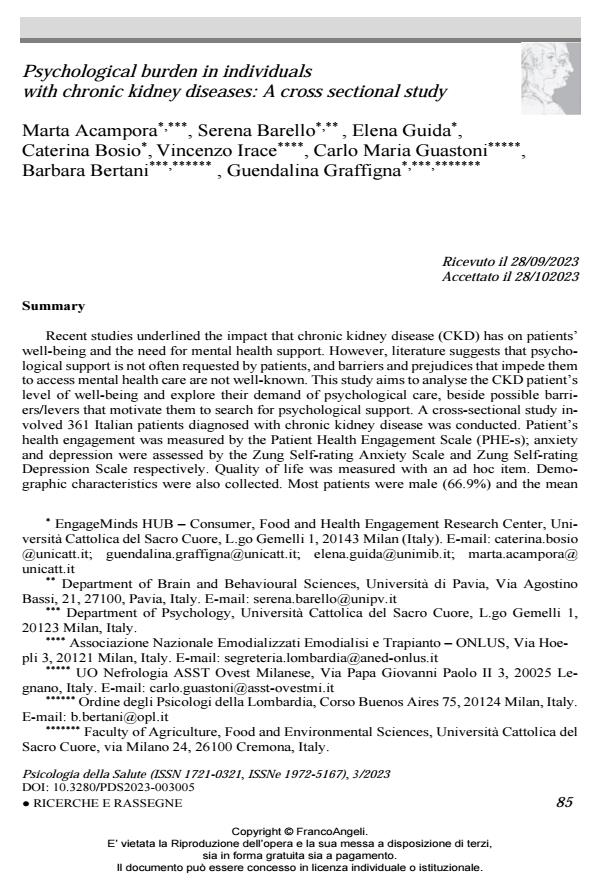Psychological burden in individuals with chronic kidney diseases: A cross sectional study
Titolo Rivista PSICOLOGIA DELLA SALUTE
Autori/Curatori Marta Acampora, Serena Barello, Elena Guida, Caterina Bosio, Vincenzo Irace, Carlo Maria Guastoni, Barbara Bertani, Guendalina Graffigna
Anno di pubblicazione 2023 Fascicolo 2023/3
Lingua Inglese Numero pagine 20 P. 85-104 Dimensione file 265 KB
DOI 10.3280/PDS2023-003006
Il DOI è il codice a barre della proprietà intellettuale: per saperne di più
clicca qui
Qui sotto puoi vedere in anteprima la prima pagina di questo articolo.
Se questo articolo ti interessa, lo puoi acquistare (e scaricare in formato pdf) seguendo le facili indicazioni per acquistare il download credit. Acquista Download Credits per scaricare questo Articolo in formato PDF

FrancoAngeli è membro della Publishers International Linking Association, Inc (PILA), associazione indipendente e non profit per facilitare (attraverso i servizi tecnologici implementati da CrossRef.org) l’accesso degli studiosi ai contenuti digitali nelle pubblicazioni professionali e scientifiche.
Recent studies underlined the impact that chronic kidney disease (CKD) has on patients’ well-being and the need for mental health support. However, literature suggests that psycho-logical support is not often requested by patients, and barriers and prejudices that impede them to access mental health care are not well-known. This study aims to analyse the CKD patient’s level of well-being and explore their demand of psychological care, beside possible barri-ers/levers that motivate them to search for psychological support. A cross-sectional study in-volved 361 Italian patients diagnosed with chronic kidney disease was conducted. Patient’s health engagement was measured by the Patient Health Engagement Scale (PHE-s); anxiety and depression were assessed by the Zung Self-rating Anxiety Scale and Zung Self-rating Depression Scale respectively. Quality of life was measured with an ad hoc item. Demograph-ic characteristics were also collected. Most patients were male (66.9%) and the mean age was of 57 years old. Overall, the 19% of patients reported a low level of health engagement and almost 30% of the sample reported a low level of quality of life. The 61.9% reported depres-sive symptoms and the 11.6% of the respondents referred the presence of anxiety. However, only the 40.5% referred to have thought of asking for a psychological support. Although study participants frequently reported psychological needs, it seems that is difficult for them to translate these needs into an actual psychological demand, due to prejudices against psycholo-gists and the stigma attached to patients undergoing psychological treatment.
Studi recenti hanno sottolineato l’impatto che la malattia renale cronica (CKD) ha sul be-nessere dei pazienti e la necessità di un supporto per la salute mentale. Tuttavia, la letteratura suggerisce che il supporto psicologico non è spesso richiesto dai pazienti e non sono note le barriere e i pregiudizi che impediscono loro di accedere alle cure di salute mentale. Questo stu-dio si propone di analizzare il livello di benessere dei pazienti con CKD e di esplorare la loro richiesta di supporto psicologico, nonché le possibili barriere/leve che li motivano a cercare un supporto psicologico. È stato condotto uno studio trasversale che ha coinvolto 361 pazienti italiani con diagnosi di malattia renale cronica. L’impegno sanitario dei pazienti è stato misura-to con la Patient Health Engagement Scale (PHE-s); l’ansia e la depressione sono state valutate rispettivamente con la Zung Self-rating Anxiety Scale e la Zung Self-rating Depression Scale. La qualità della vita è stata misurata con un item ad hoc. Sono state raccolte anche le caratteri-stiche demografiche. La maggior parte dei pazienti era di sesso maschile (66.9%) e l’età media era di 57 anni. Nel complesso, il 19% dei pazienti ha riferito un basso livello di impegno per la salute e quasi il 30% del campione ha riferito un basso livello di qualità della vita. Il 61.9% ha riferito sintomi depressivi e l’11.6% degli intervistati ha segnalato la presenza di ansia. Tutta-via, solo il 40.5% ha riferito di aver pensato di chiedere un supporto psicologico. Sebbene i partecipanti allo studio abbiano spesso segnalato bisogni psicologici, sembra che sia difficile per loro tradurli in una vera e propria richiesta psicologica, a causa dei pregiudizi nei confronti degli psicologi e dello stigma legato ai pazienti in trattamento psicologico.
Parole chiave:aspettative di cura, malattia renale cronica, emodialisi, salute mentale, burden psicologico.
Marta Acampora, Serena Barello, Elena Guida, Caterina Bosio, Vincenzo Irace, Carlo Maria Guastoni, Barbara Bertani, Guendalina Graffigna, Psychological burden in individuals with chronic kidney diseases: A cross sectional study in "PSICOLOGIA DELLA SALUTE" 3/2023, pp 85-104, DOI: 10.3280/PDS2023-003006